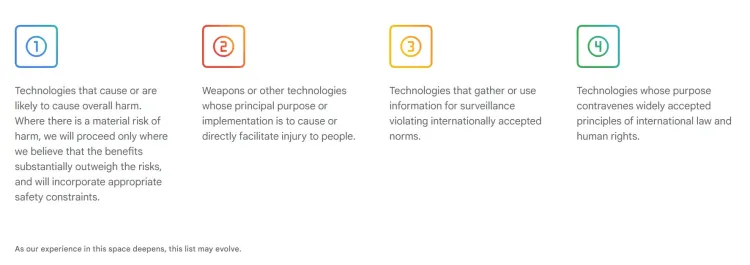The search giant has removed some of its AI principles, citing a ‘complex geopolitical landscape.’
In a significant shift, Google has updated its artificial intelligence (AI) principles, quietly removing previous commitments that barred the company from using AI in ways that could cause harm. The revised guidelines no longer include explicit prohibitions on developing AI for weapons, surveillance, or technologies designed to injure people. This crucial change, first identified by The Washington Post and preserved in the Internet Archive, signals a major transformation in Google’s approach to AI ethics.
A Strategic Shift in AI Ethics
Google’s updated AI principles mark a departure from its earlier stance, which had emphasized avoiding harm and steering clear of military applications. These principles were initially introduced in response to growing concerns about AI’s potential for misuse, particularly after backlash over the company’s involvement in Project Maven—a controversial Pentagon initiative that utilized AI to analyze drone footage.
The revised principles were accompanied by a blog post from Google DeepMind CEO Demis Hassabis and James Manyika, the company’s senior executive for technology and society. The post introduced new “core tenets” that will guide Google’s AI development moving forward, focusing on innovation, collaboration, and so-called “responsible AI development.” However, the commitment to avoiding AI applications for military or surveillance use is notably absent.
“There’s a global competition taking place for AI leadership within an increasingly complex geopolitical landscape,” the blog post states. “We believe democracies should lead in AI development, guided by core values like freedom, equality, and respect for human rights. And we believe that companies, governments, and organizations sharing these values should work together to create AI that protects people, promotes global growth, and supports national security.”

While the statement emphasizes democratic leadership in AI, it also subtly acknowledges the role of AI in national security—an area from which Google had previously distanced itself.
From Caution to Competition: The Evolution of Google’s AI Ethics
Google’s AI ethics policies have undergone significant changes over the years. When Google acquired DeepMind in 2014, the acquisition reportedly included a clause preventing DeepMind’s technology from being used for military or surveillance applications. However, as AI technology has rapidly advanced, Google’s position has evolved to align more closely with its competitors.
Meta (formerly Facebook) allows its AI, LLaMA, to be used for certain military applications, and OpenAI’s ChatGPT is permitted for specific military use cases. Amazon has also struck a deal with government software provider Palantir to supply AI capabilities to the U.S. military and intelligence agencies through Anthropic’s Claude AI. By revising its principles, Google is adapting to a competitive landscape where AI ethics are increasingly shaped by geopolitical and corporate interests rather than strict moral boundaries.
Google’s History of Military Contracts
Despite its previous public stance against developing AI for warfare, Google has been involved in various military-related projects:
- Project Maven (2018): Google helped the Pentagon analyze drone footage using AI, sparking internal protests from employees who argued that the work violated the company’s AI ethics.
- Project Nimbus (2021): Google, alongside Amazon, provided cloud computing services to the Israeli government, further stirring controversy.
These partnerships demonstrate that, despite its once-strict principles, Google has long found ways to collaborate with military and government agencies on AI projects. The recent policy update could signal an even greater openness to such engagements.
What This Means for AI’s Future
Google’s decision to remove its explicit ban on AI for military and surveillance use reflects a broader shift in the AI industry. As AI becomes a key component in defense, cybersecurity, and intelligence operations, major tech firms are increasingly aligning themselves with governmental and military interests.
The move also raises ethical concerns. Without clear boundaries, AI’s potential for harm—whether through autonomous weapons, mass surveillance, or disinformation campaigns—becomes harder to regulate. While Google insists it remains committed to “responsible” AI development, the absence of firm commitments against harmful applications leaves room for interpretation.
As AI continues to evolve, the balance between ethical responsibility and global AI competition will remain a contentious issue. With Google now in step with other tech giants, the question is no longer whether AI will be used in military contexts—but rather how and to what extent.
Final Thoughts
Google’s quiet policy change reflects a larger trend in the AI industry, where competition and national security concerns increasingly override previous ethical commitments. As the company moves forward, it remains to be seen how these new principles will shape its role in the global AI arms race. What is clear, however, is that the days of Google’s firm stance against AI for weapons and surveillance are over.










